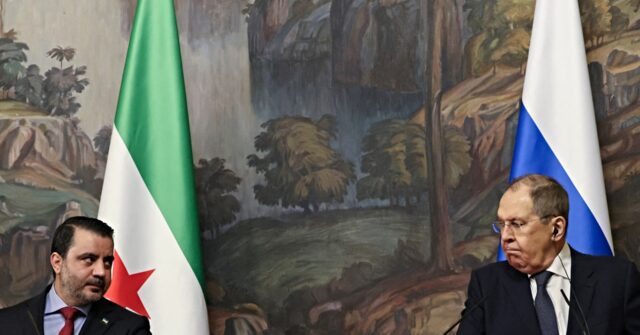The jihadist “interim” government of Syria sent a delegation to Moscow on Thursday for talks to facilitate better communication with the defense ministries of both countries, reports claimed – a challenge following Russia’s decades-long support of former dictator Bashar Assad, who the current government deposed.
President Ahmed al-Sharaa, a jihadist formerly known as “Abu Mohammed al-Jolani” who ran the al-Qaeda offshoot Hayat Tahrir al-Sham (HTS), has attempted to rebrand since the demise of the Assad regime as a pragmatist primarily concerned with attracting foreign investment for post-war reconstruction in Syria. These efforts have included multiple friendly meetings with American President Donald Trump and a bizarre public appearance last month alongside retired Gen. David Petraeus, who awkwardly noted that Sharaa was once his prisoner as the head of U.S. forces in Iraq.
Sharaa has nonetheless maintained a distance from Russia and endeavored to bring Syria closer to the government of Ukraine, which has been attempted to fight off a full-scale Russian invasion for three years. Complicating matters is Russia’s ongoing military presence in the country, including at least two bases, which Moscow has expressed interest in maintaining despite the fall of ally Assad.
The Turkish newspaper Hurriyet reported on Thursday that the Syrian delegation on Moscow “was led by Chief of the General Staff of the Syrian transitional government’s armed forces, Major General Ali Al-Naasan” and focused on facilitating communication. The military leaders’ visit precedes a planned visit to Moscow by Sharaa himself later in October.
“This visit is part of efforts to enhance coordination mechanisms between the defense ministries of both countries,” the Russian government stated.
Some reports indicated that the Sharaa government has attempted to explain the meeting as a routine visit to elevate Syria’s diplomat status abroad, but has faced pushback at home given Russia’s poor reputation in Syria. The local affairs outlet Syrian Observer reported that Damascus has continued to engage Russia given the country’s presence at two major military sites, “the Hmeimim airbase and the Tartous naval facility” and the two sides are believed to be engaged in discussions on what to do with those sites. The government itself has not offered specifics on the nature of the talks this week, however.
File/23 September 2025, USA, New York: Volodymyr Zelensky (M-r), President of Ukraine, and Ahmed al-Sharaa, President of Syria, take part in the general debate of the U.N. General Assembly. (Kay Nietfeld/picture alliance via Getty Images)
The visit to Moscow appears to be a follow-up to discussions in Damascus last week, when Deputy Prime Minister Alexander Novak of Russia visited and told reporters that the regime of strongman Vladimir Putin was interested in “rehabilitating Syria’s energy sector.” The Syrian Arab News Agency (SANA), a government media outlet, reported that energy reconstruction was part of a larger conversation touching on “cultural, scientific, and educational collaboration, [as] approximately 4,000 Syrian students are currently enrolled in Russian universities.” Again, however, details were scarce.
The highest-level engagement between Sharaa’s jihadi government and Moscow so far occurred in July, when Syrian Foreign Minister Asaad al-Shaibani visited the Russian capital. Shaibani emphasized the importance of fostering “mutual respect” between the two countries but made clear that Sharaa did not intend to allow Russia to maintain any robust military presence in the country.
“The current period is full of various challenges and threats, but it is also an opportunity to build a united and strong Syria. And, of course, we are interested in having Russia by our side on this path,” Shaibani claimed at the time.
His Russian counterpart, Foreign Minister Sergey Lavrov, claimed that Russia was open to giving Syria “what is possible for economic recovery” after the war.
Sharaa himself has not engaged Russia at the highest level yet, however, though reports indicate he will soon travel to the country. Instead, Sharaa used the opportunity of the United Nations General Assembly in September to formally establish a relationship with Ukraine. Under Assad, a close ally of Iran and Russia, Syria and Ukraine had no functional relationship. Sharaa ended this status quo by meeting Ukrainian President Volodymyr Zelensky in person, signing a “joint communique” cementing diplomatic ties.
“During our negotiations with President of Syria Ahmed al-Sharaa, we also discussed in detail promising sectors for developing cooperation, security threats faced by both countries, and the importance of countering them,” Zelensky said in a statement following the meeting. “We agreed to build our relations on the basis of mutual respect and trust.”
During his speech before the General Assembly, Sharaa did not give any indication that his government was interested in moving on from the atrocities committed by the Assad regime, with support from Russia.
“The previous regime used the worst kind of torture against our people — chemical weapons, and bombardment, and torture, and prison, and displacement, and sectarian strife,” he stated. “The former regime killed around a million innocent people and displaced millions, demolished two million homes. Unarmed people were attacked using chemical weapons. Our women and children have inhaled toxic gases.”
Assad fled the country on December 7, resurfacing in Moscow. Unverified reports this week claimed that Assad survived a poisoning attempt in the Russian capital. The HTS government in Damascus has not at press time commented on those reports.
Follow Frances Martel on Facebook and Twitter.
Read the full article here


